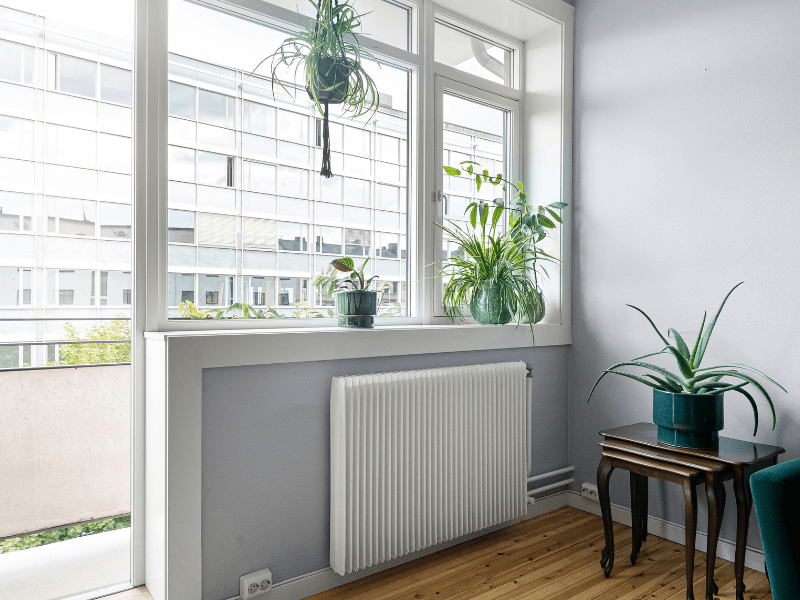
As the cool autumn weather hits, space heaters, fireplaces, and furnaces turn on all over the neighborhood. But while these devices offer a cozy respite from the chill outside, they can also pose a fire risk.
Nearly 50 percent of home heating fires occur this time of year, peaking from December to February. Without careful supervision, maintenance, and precautionary measures, indoor heating equipment can cause both electrical fires and space heater fires to ignite.
Fortunately, residential fire sprinklers are able to control and extinguish a blaze in less than two minutes. Here’s what to know about space heater fire hazards—plus, how to minimize the risks and ensure maximum fire sprinkler function, both in this season and all year long.
Why Heating Season Raises Your Fire Risk
Portable electric heaters are among the main fire safety concerns during the fall and winter seasons. In fact, space heaters, generators, and other electric heating equipment cause an estimated 1,600 structural fires, 70 deaths, and 160 injuries per year.
Wood stoves, furnaces, and chimneys can also spark a blaze when they aren’t correctly monitored or maintained. Bottom line: whatever kind of equipment you use, heating and electrical fires are leading culprits of residential fires—especially in these colder months.
Space Heater Safety Tips that Actually Work
Basic safety measures—combined with functional smoke alarms and fire sprinklers—can neutralize many common heat-related hazards. Follow these simple but effective habits any time a portable heater is in use to lower the risk of a space heater fire.
- Keep a three-foot clearance zone around all heaters and any flammable materials in the general vicinity. This includes linens, curtains, furniture, and carpeting.
- Choose portal heating units with tip-over and overheat shut-offs, and a UL/ETL certification. Plug the heaters directly into a wall outlet—avoid the use of power strips or long extension cords to protect against electrical fires.
- Turn all heaters off before you leave a room or head off to sleep.
Furnace, Fireplace, And Chimney Must-Dos
Blocked vents or creosote build-up in furnaces, fireplaces, and chimneys are common—but preventable hazards—that tend to increase in the fall and winter. So, before the cold weather settles in, schedule an annual cleaning service and inspection for all this equipment.
The Fire Sprinkler Question: Facts That Ease Common Worries
Homeowners often hesitate about installing fire sprinklers due to a host of misconceptions. Here are a few reassuring answers to questions that homeowners ask about these critical devices:
- “If one head activates, won’t they all go off?” No. Home fire sprinklers operate independently, meaning just the head closest to a fire activates—not the entire system. Activation is caused by heat detection, not the presence of smoke.
- “Will the sprinkler water cause more damage than a fire itself?” Sprinklers control or extinguish a fire in its early stages, which uses much less water than a firehose would after the blaze spreads out of control. This quick response can dramatically minimize heat, smoke, and other damage.
- “Can the sprinklers accidentally discharge?” This malfunction is extremely rare. Sprinkler heads are built to respond only when exposed to high temperatures—usually 135–165°F.
Simple Upgrades for Maximum Fire Protection
Both space heater fires and electrical fires can be rampant this time of year. But stacking proven safety tactics on top of each other will make it easier to snuff out a spark before it becomes an emergency.
- Schedule furnace tune-ups, sweep chimneys, and check all vents before peak seasonal heater usage.
- Look for space heaters with automatic shut-offs, keep the cord short, and plug it directly into a wall outlet.
- Sleep with your bedroom door shut to slow the spread of heat and smoke. This will buy precious minutes to escape and give your fire sprinkler a chance to do their job.
- Test your smoke and carbon monoxide alarms at least once a month, and schedule an inspection of your fire sprinklers and all electric heating equipment.
Protect Your Home Before the Next Cold Snap
Cold weather can push heating equipment to the brink—and in the event a space heater fire starts, every second matters. Therefore, it’s crucial to ensure you take the right precautions with smart safety measures and a residential fire sprinklers system in top-notch condition.
Schedule a brief consultation with A&A Fire Protection to review your fall and winter safety plan and lock in the inspections you need before those frosty temperatures arrive in full force.



